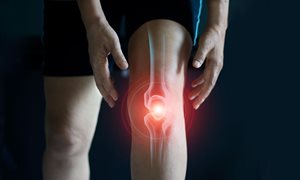
Integrated photonics is a technology that will be decisive in the coming years in terms of innovative solutions in healthcare. In time, this technology can make healthcare many times more accessible and cheaper. At Radboudumc's spin-off Enzyre they see opportunities for integrated photonics.
Photonics is similar to 'ordinary' electronics. However, instead of electrons, photonics uses photons ('light particles') to transfer information. Photonic technology detects, generates, transports, and processes light. Current applications include solar cells, sensors, and fiber optic networks. In addition, there are photonic chips: called Photonic Integrated Circuits (PICs) in jargon. These integrate various photonic and often electronic functions into a microchip. In this way, they make smaller, faster and more energy-efficient devices. Because they are manufactured similarly to traditional chips, mass production and price reduction are also within reach.
Healthcare more accessible and cheaper
The promise is that photonics will make healthcare more accessible and cheaper. More accessible, because patients no longer need to go to the hospital for non-acute examinations. They can do the examination themselves at home. Photonics also makes it possible to weld and cut with a laser beam. It can help measure the oxygen level in the blood (blood saturation), scan a suspicious birthmark, or take a heart ultrasound. Apart from this it is also cheaper for society to detect and prevent diseases at an early stage.
PhotonDelta and Enzyre
in an article in the journalistic platform Innovation Origins (IO), Adrie Boxmeer writes that various Dutch start-ups have a very good idea of the opportunities of photonics. In cooperation with PhotonDelta, IO highlights several start-ups that are working on this technology. One is Enzyre, a spin-off of Radboudumc and based at the Novio Tech Campus in Nijmegen. There they make a device that examines the clotting factor VIII in the blood. Waander van Heerde is a director at the company. In 2016, he founded it together with Guido Maertens.
Platform technology for hemophiliacs
Van Heerde was the head of the special coagulation lab at the Radboudumc for 17 years, where he still works two days a week: "Our platform technology will be used first for hemophiliacs. These people have a shortage of factor VIII in their blood, which increases the risk of bleeding. This can be treated very well by injections with which patients themselves bring the quantity of FVIII to the right level. With our device the patient can measure the extent of the Factor VIII deficiency at home. With an additional injection, that patient can then quickly adjust it themselves, stopping the bleeding."
Big future for photonics in the Health sector
Enzyre's application works by measuring the number of photons in the blood. Until now, they do that via a sensor that works on classic chips. Van Heerde: "In the future you can also do that with photonic sensors, making it cheaper and faster. Then we also need less blood for research." Van Heerde foresees a great future for photonics in the Health sector. "Healthcare has to become cheaper. This can be done with integrated photonics, because optical chips are faster, use less energy and this makes it more efficient. Through photonics the laboratory is no longer in the hospital, but we bring it to the patient in the living room."
Sources: Lifeport & Innovation Origins
-
Want to know more about these subjects? Click on the buttons below for more news.
Related news items

Meniscus prosthesis Atro Medical receives 2.5 million EU grant
10 June 2022 The European Commission is providing a 2.5 million euro grant to ATRO Medical, spin-off of The Radboudumc and DSM, for the accelerated development of their artificial meniscus. go to page
More accurate surgery with the Anatomy Projector
30 May 2022The Anatomy Projector, developed at the Radboudumc, allows surgeons to operate much more accurately with projected augmented reality.
go to page
Field research on malaria vaccine offers unexpected surprise
23 May 2022Field research on the effectiveness of a malaria vaccine, came up with unexpected results for an international group of researchers including Benjamin Mordmüller of Radboudumc. The vaccine evokes a broader response against malaria proteins than there are in the vaccine.
go to page
Nearly 22 million for brain research Radboudumc and University involved in many Gravity projects
10 May 2022 Francesco Battaglia will use a Gravity grant to study how brains work. Other Gravity projects involve several researchers from Radboudumc and Radboud University. go to page
Rubicon grants awarded to three RIMLS researchers
19 April 2022Three researchers have received Rubicon funding from NWO/ZonMw. This will enable Elke Muntjewerff, Laura de Vries and Laurens van de Wiel to do research at a foreign research institute for the next two years.
go to page
